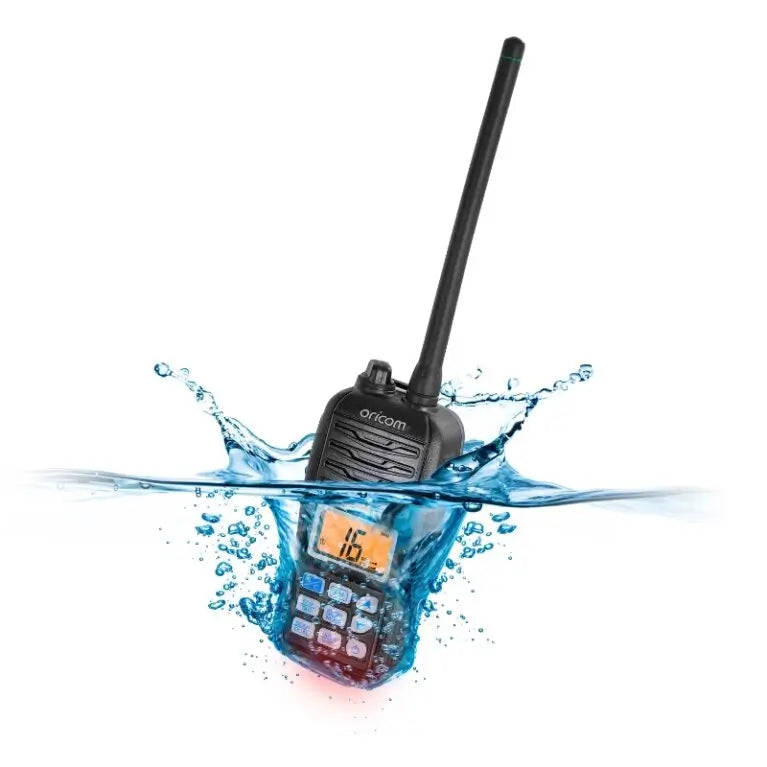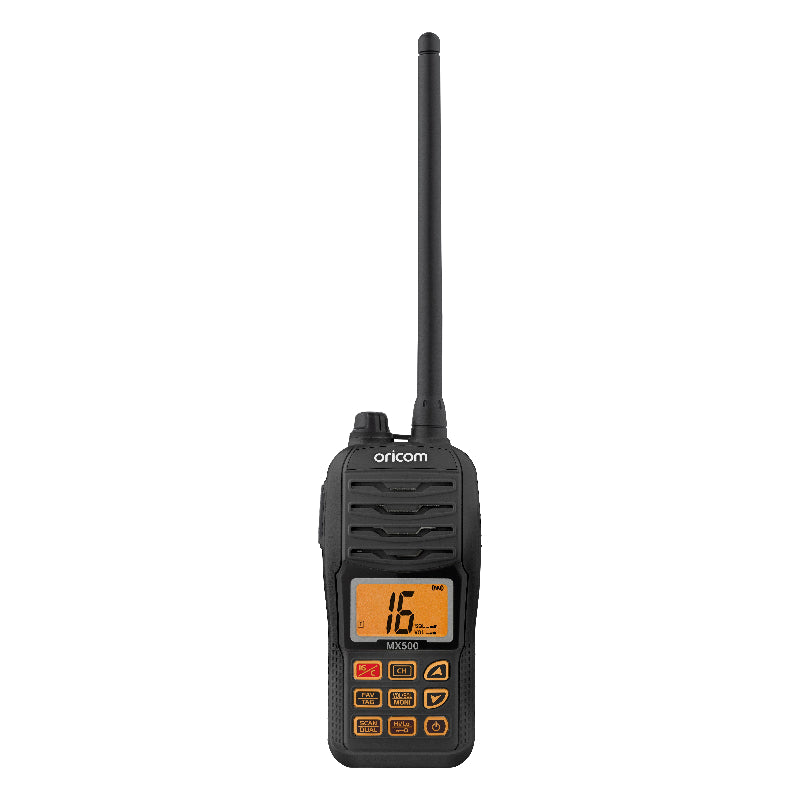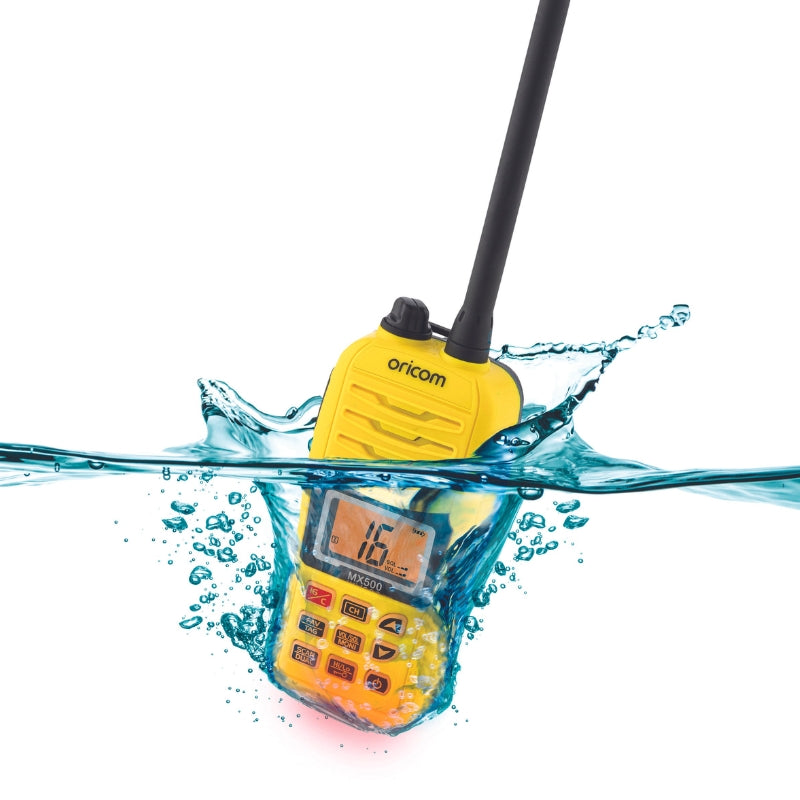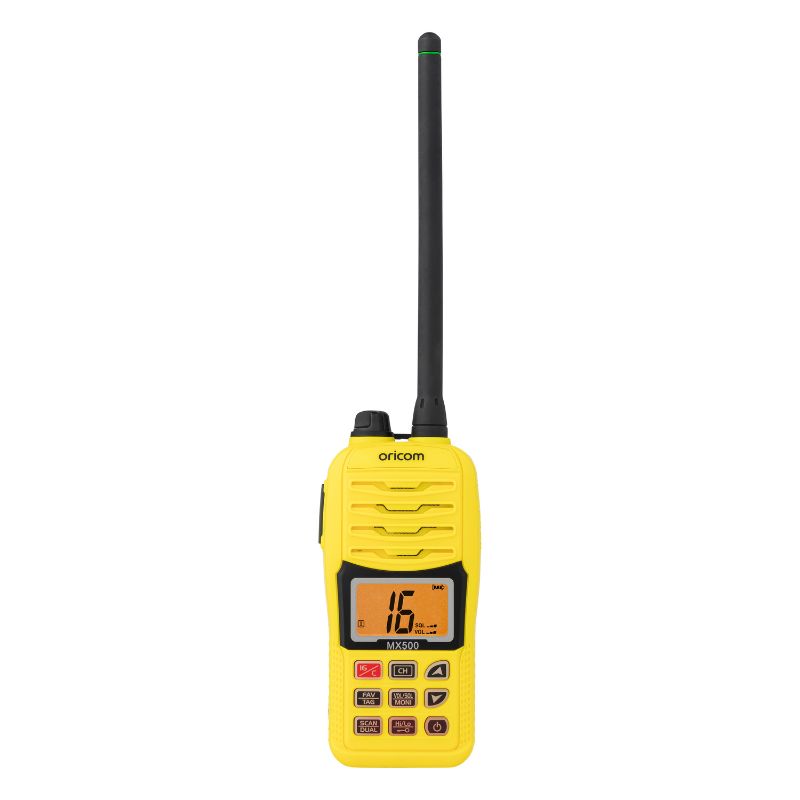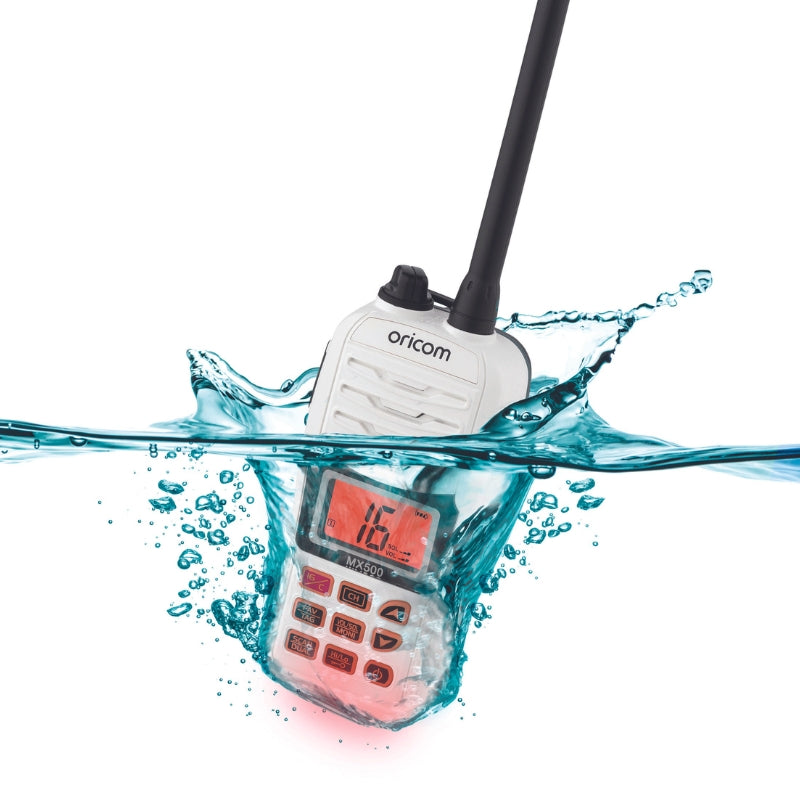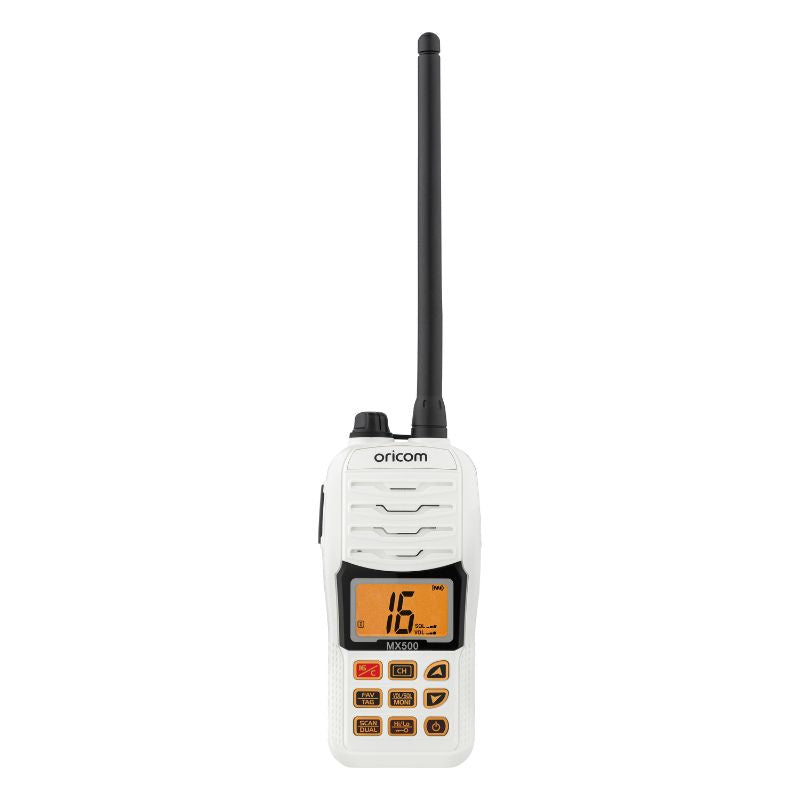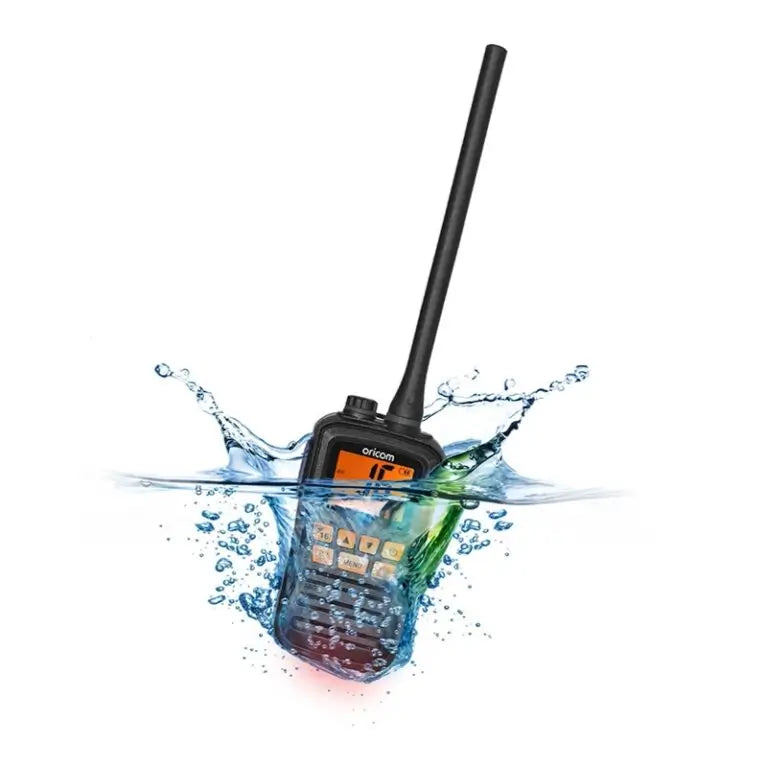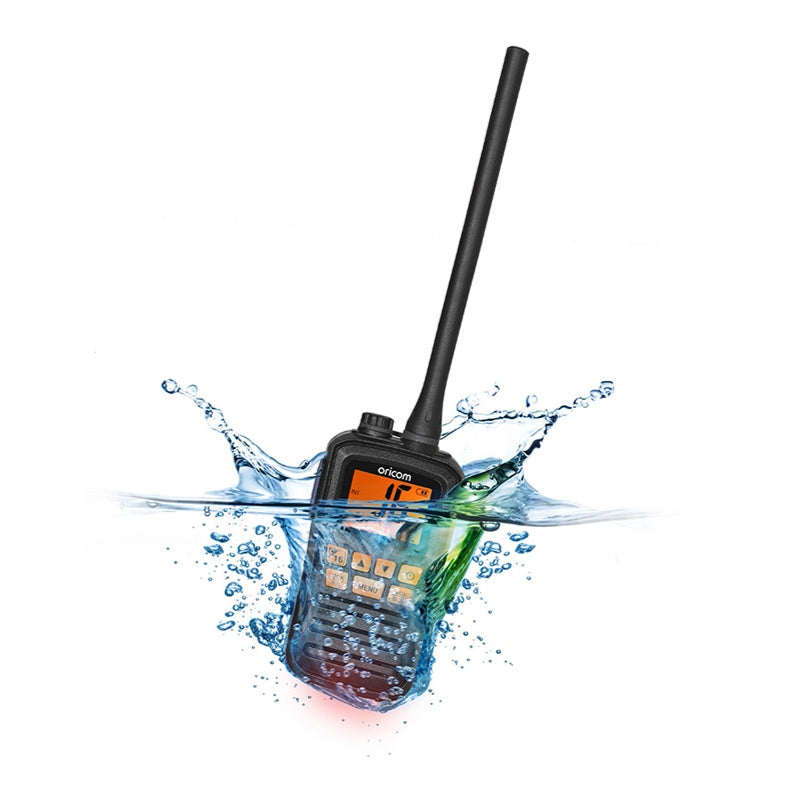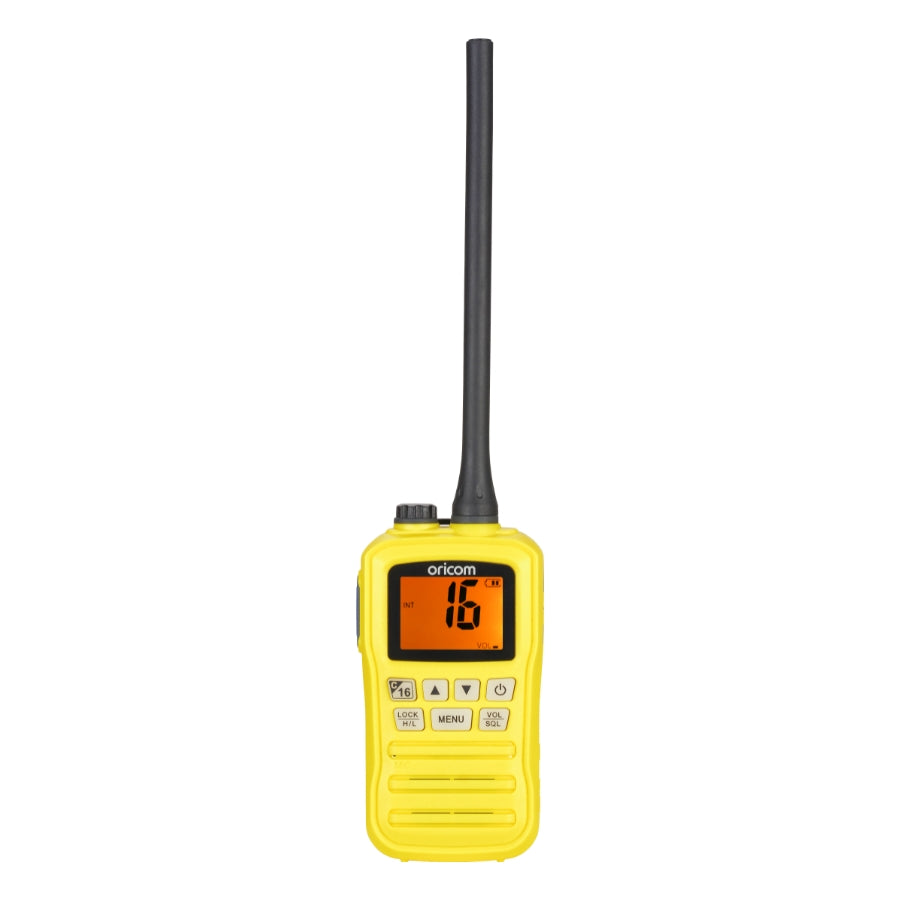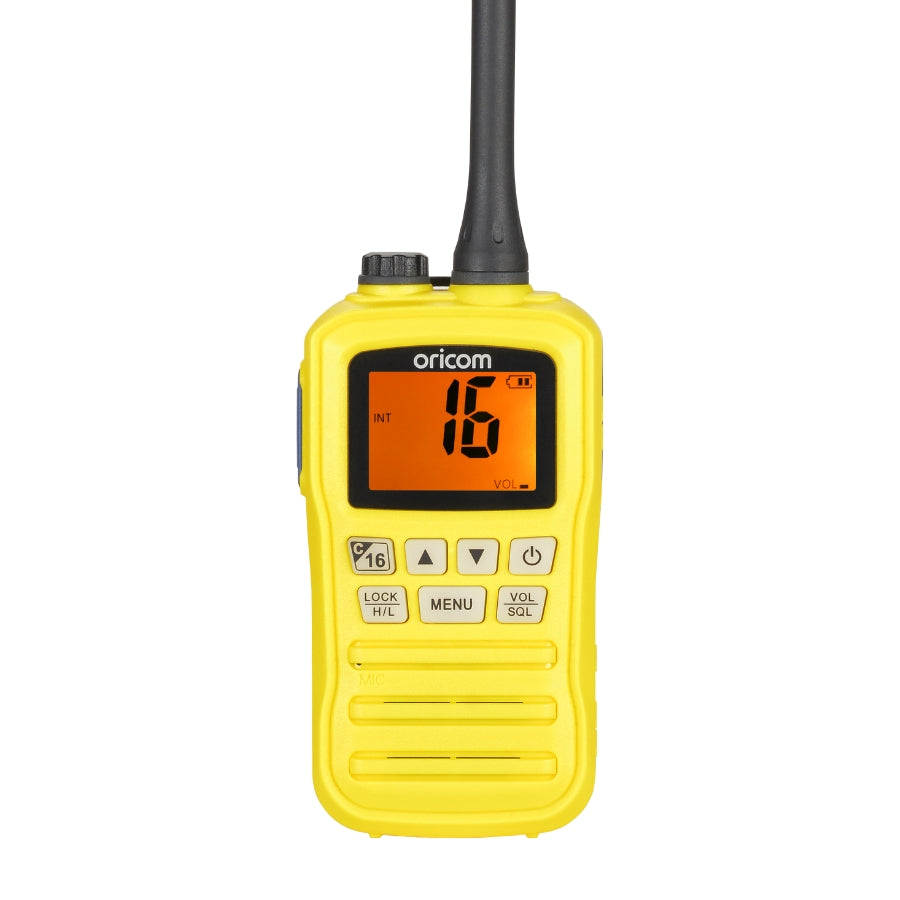Communication isn't optional when heading out on Australian waters, whether for a quick fishing trip or an offshore journey. A marine radio becomes your lifeline when mobile coverage fails. From sudden weather shifts to coordinating with fellow boaters, VHF handheld marine radios deliver the consistent performance that keeps you connected and safe.
Built for local marine conditions and trusted by Aussie boaters, Oricom’s range of handheld VHF radios delivers durability, clarity, and convenience in a compact format. Whether you're piloting a tinnie on a quiet inlet or exploring open waters, staying in touch is essential.
Why a VHF Handheld Radio is a Smart Choice for Every Aussie Boater
Boating in Australia presents unique challenges, including wide coastlines, unpredictable weather, and remote locations where traditional mobile networks simply don't reach. This is where handheld VHF marine radios come into their own.
Unlike smartphones, handheld VHF radios are designed specifically for marine communication, which can lose reception offshore. They allow instant connection with nearby vessels, marinas, and emergency services, using standard marine frequencies monitored around the clock by Australian authorities.
Designed for Safety and Convenience
Oricom’s handheld models, including the MX300 and MX500, come equipped with features that help you stay in control no matter the situation:
- Water-resistant casings rated IPX7 or IP67 to handle salt spray and splashes
- Floating designs with auto-activating lights for easy retrieval if dropped
- Large, tactile buttons designed for operation with wet or gloved hands
- Bright backlit displays are readable in full daylight or low light
- Long-lasting rechargeable batteries offering up to 8 hours of reliable use
- Multiple power settings (3 or 5-watt options) to manage battery life and range
These rugged units are compact, portable, and purpose-built for local conditions, whether crossing a bar, drifting in a tinnie, or launching from a quiet riverbank. With Oricom’s reputation for marine-ready design and dependable performance, VHF handheld radios are the choice for any boater who values safety and self-reliance.
VHF Marine Radio Features That Support Every Adventure
Choosing the right marine radio goes beyond simply picking a device with a good signal. It's about finding equipment that works with you on every journey.
Emergency Readiness
Every Oricom handheld marine radio gives you immediate access to emergency channels, like Channel 16, which is monitored 24/7 by rescue services. Some fixed mount models also feature Digital Selective Calling (DSC), a function that can send your vessel's ID and even your location to other radios, improving response times in emergency situations.
Ease of Use Onboard
Whether you’re new to boating or a seasoned skipper, Oricom’s user interface is designed for simplicity. Backlit keypads, automatic scanning, and intuitive menus allow anyone on board to use the radio confidently.
The radios are compact and lightweight, making them easy to carry or clip onto your gear. This flexibility is convenient when moving between your main vessel and a tender, or for solo fishers operating away from the helm.
Marine Radio Use and Care Tips
Follow these simple care routines to get the best performance from your handheld marine radio and extend its life. These are especially important in harsh saltwater environments.
- Charge the battery fully before every trip to ensure you’re ready for a full day on the water.
- Test your radio by confirming transmission and reception on working channels before launch.
- Inspect the casing, seals, and antenna for signs of wear, corrosion, or impact damage after each use.
- Rinse with fresh water to remove salt residue, especially around buttons and the speaker vents.
- Dry thoroughly before storage to avoid moisture buildup inside connectors or the charging cradle.
- Store in a cool, dry place away from direct sunlight or enclosed wet compartments
For the MX300 and MX500 models, it’s also a good idea to check that the floatation light and keypad lock functions are operating properly. These radios are tough, but routine checks help ensure reliable communication in any situation.
Oricom provides user guides and maintenance instructions tailored to each model, and their Australian-based support team is available to assist with setup, channel selection, and general usage.
Oricom Handheld VHF Models and Their Features
Oricom currently offers two handheld VHF radios in its marine collection: the MX300 and the MX500. Each offers specific benefits depending on your style of boating.
MX300 – Lightweight and Compact
The Oricom MX300 3-Watt VHF Marine Radio delivers switchable power of 3 and 1 watts. It is built to withstand harsh marine environments and is waterproof to IPX7 standards. If dropped overboard, it floats and remains visible for easy retrieval. The unit also includes all international, US, and Canadian marine VHF channels. Its battery lasts up to eight hours based on typical duty cycle usage.
This model is ideal for kayaks, jet skis, or small boats without fixed power systems or limited space.
MX500 – Full‑power and Highly Visible
The Oricom MX500 5-Watt Handheld Marine Radio offers full transmission power of 5 watts, legally permitted in Australia, along with a 1-Watt low‑power setting. Like the MX300, it is waterproof to IP67 and floats while flashing an LED for visibility. It includes a user-friendly backlit display and keypad lock to avoid accidental setting changes. It is built tough for salt spray, splashes, and wet conditions.
Models are available in black, white, or high‑visibility yellow.
Battery performance is designed to support at least eight hours of typical use, with sufficient standby, transmit, and receive ratios.
Picking the Right Handheld Marine Radio for Your Boating Needs
Every boating lifestyle is different, and Oricom’s line of handheld radios caters to a wide range of marine users, from weekend hobbyists to professional operators.
Small Boats and Kayaks
Suppose you're fishing from a kayak or piloting a small runabout, space and weight matter. A portable VHF handheld radio fits easily in your dry bag, tackle box, or on a lanyard. It allows you to communicate with shore or larger vessels without a fixed setup.
Standardised Safety Features Across MX300 and MX500
Both models offer essential marine radio capabilities designed for effective and safe usage:
- Water resistance and float‑and‑flash design: fully sealed to marine ratings (IPX7 or IP67) and floatable with flashing LED.
- Ease of reading and use: MX500 has backlit displays, an intuitive keypad design, and a keypad lock for use with gloves or wet hands.
- Battery life up to eight hours: long standby periods allow full‑day use without recharge.
- International channel coverage: built‑in access to all standard marine VHF channels in Australia, the US, and Canada.
Choosing Between MX300 and MX500
Understanding your boating habits helps determine the best fit between these models:
- Choose the MX300 if you voyage in sheltered waterways or run small craft with limited battery space. Its lighter weight and compact size fit easily in kayaks or dry bags.
- Choose the MX500 if you head offshore or require full transmission strength to reach other vessels or marina operators. Its bright colour options also improve visibility if dropped in the water.
Fixed Mount vs Handheld VHF Radios: Which One Fits Your Style?
Understanding the strengths of fixed mount and handheld marine radios can help you make the right decision for your vessel.
Fixed Mount Radios: Best for Large Vessels
- Higher transmission power
- Wired directly into the boat's power supply
- Ideal for bluewater cruising and extended offshore use
- Larger displays and channel access for extended communication
These are great for those who need robust, permanent equipment at the helm.
Handheld Radios: Built for Versatility
- Lightweight and portable
- Battery-powered and floatable options
- Easy to carry from the boat to land
- Quick access to emergency and standard channels
For many Aussie boaters, having both options provides the ideal setup: a fixed radio at the helm and a handheld unit as a backup or for use away from the console.
Use Cases and Recommendations
Solo Fishers and Small Boat Owners
Use an MX300 or MX500 as your primary marine radio. The MX300 is lighter and easier to carry when weight matters, while the MX500 offers an extended range that increases safety in offshore areas. Both models provide reliable voice communications for marina check‑in, position reporting, or vessel‑to‑vessel links.
Family Cruising and Open‑Water Trips
Install a fixed‑mount radio like the MX1100G at the helm for continuous range and DSC emergency access. Keep an MX500 handheld as a secondary unit or away from the console. Its visibility and float‑and‑flash features add an extra layer of safety.
Rental or Tour Operators
High‑visibility MX500YW (yellow) minimises loss risk. The floating alert and bright casing make it easier to recover if dropped. Having users' wearable radios improves coordination and emergency readiness during tours or group outings.
Maintenance and Best Practices for Marine Radios
Even the best gear needs routine care. Follow these tips to keep your handheld marine radio working at its best:
- Charge the battery before each trip
- Test the channel connection.
- Inspect seals and casing for wear.
- Keep your radio clean and dry between uses.
Oricom offers customer support and guides to help you with setup, troubleshooting, and channel usage, so you’re never left guessing.
Why Oricom is the Trusted Choice Across Australia
Oricom has built a reputation as one of Australia’s leading names in marine communication technology. As a 100% Aussie-owned company, Oricom understands the real-world needs of local boaters, anglers, and marine professionals.
With products that meet all Australian marine standards, Oricom ensures full compliance with emergency protocols and reliable operation under harsh conditions. And with local support, warranty services, and expert advice available, you’re never far from help when needed.
Why Choose Oricom for Marine Communication
Oricom is a fully Australian‑owned company established in 2003. It specialises in communication gear engineered for conditions in Australia and New Zealand. Built tough, compliant with local standards, and backed by local customer support, Oricom radios are trusted by recreational boaters, anglers, and professionals alike.
Make the Safe, Smart Choice for Your Boat
If you're ready to upgrade your communication gear or equip your vessel for the first time, start with a VHF handheld marine radio from Oricom. Reliable, user-friendly, and purpose-built for Australian waters, these radios are essential to your marine safety kit.
Visit Oricom’s Handheld Marine Radio Collection to compare models, accessories, and bundle offers. New customers can take advantage of exclusive savings and member-only benefits.
Stay safe, stay connected, and confidently head out knowing your Oricom radio has your back.

